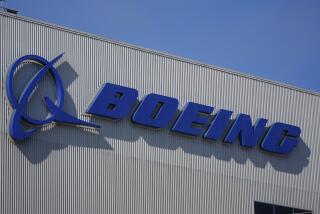UAL Stock Off $56; Wolf Tries to Revise Bid
- Share via
UAL Corp. shares plunged more than $56 Monday as the airline’s pilots and managers worked to revise their failed $6.75-billion offer for the parent of United Airlines.
The steep drop in UAL’s shares followed the announcement Friday that the employee group, led by UAL Chairman Stephen M. Wolf, had not been able to raise the $4.2 billion needed to buy the company. The news triggered a sharp decline in the stock market Friday, and UAL’s shares fell $5.50 that day before trading was halted. UAL shares closed Monday at $222.88.
Airline industry analysts and professional stock speculators said in interviews Monday that they expected the Wolf group to make a new offer for the company. Some said they anticipated that the new offer would be a combination of cash and securities worth about $240 a share.
Wall Street traders said they believed that a new offer would emerge because Wolf and other top UAL officers stand to make huge profits in a takeover. The employee group had offered $300 a share for the company, and Wolf’s UAL stock and options were worth around $76 million at that price. “I can’t see Wolf give up all that profit,” one trader said.
News reports from Tokyo early this morning said several large Japanese banks are willing to finance the UAL transaction on new terms. The report in Nihon Keizai Shimbun, a Japanese business journal, said Citibank had presented eight large Japanese banks a revised offer that involved a lower purchase price for UAL shares and larger fees for the banks.
Many banks in the United States and Japan balked at the terms for the failed UAL deal because they included skimpy fees for the banks and involved loading too much debt on the airline. At a lower price, UAL would be able to take on less debt to complete the transaction. Citibank and Chase Manhattan are acting as lead banks on the UAL deal.
According to the report in Nihon Keizai Shimbun, Citibank said the Wolf group would lower its bid to $250 a share, reducing the amount it would need to borrow to $6.1 billion from $7.2 billion. The report also said the banks could raise the interest rate on the loan to 2.5% above the rate that banks charge each other, known as LIBOR, the London interbank offered rate. Originally, the rate was to be 2% above LIBOR.
Citibank refused to comment on the report, and an adviser to United’s pilots said there was no new deal. “If Citibank is doing that, they are feeling out the Japanese banks to see what is acceptable to them,” said Stuart I. Oran, a lawyer with the New York firm of Paul Weiss, Rifkind, Wharton & Garrison. “There is no revised deal.”
Oran said United’s pilots and management had discussed various changes in the transaction, but he would not describe them. Oran said that the Wolf group is not looking for another partner. “That is one thing we have not discussed,” he said.
Some airline industry analysts speculated that the Wolf group might look for another equity investor to make the transaction more acceptable to possible lenders. British Airways was to supply $750 million, more than three-quarters of the equity.
Daniel Hersch, an analyst with the Los Angeles investment firm of Bateman Eichler, Hill Richards, said it is possible that the United employees might recruit a partner and reduce their ownership stake to 30% from 75%. However, under such a scenario, United’s employees would no longer control the airline, and “that might be an issue for United’s management,” Hersch said.
Mentioned as possible investors in the UAL deal were Los Angeles investor Marvin Davis and Morgan Stanley, the New York investment house. Davis triggered the bidding for UAL in August by offering $240 a share. Davis was studying the situation Monday.
Analysts said a lower bid by the Wolf group would probably mean that British Air could reduce its contribution. British Air said Monday that it was “reviewing its position” regarding the UAL bid “together with the other participants.”
In an interview Monday, an officer with Chase Manhattan said the $300-a-share bid for UAL fell apart because of concerns from lenders about the fees and doubts about United’s financial projections. Thomas G. Labreque, president and chief operating officer for Chase Manhattan, defended the deal. “The cash flows in this deal were quite good,” he said.
Times staff writer James Bates in Washington contributed to this story.
More to Read
Inside the business of entertainment
The Wide Shot brings you news, analysis and insights on everything from streaming wars to production — and what it all means for the future.
You may occasionally receive promotional content from the Los Angeles Times.










